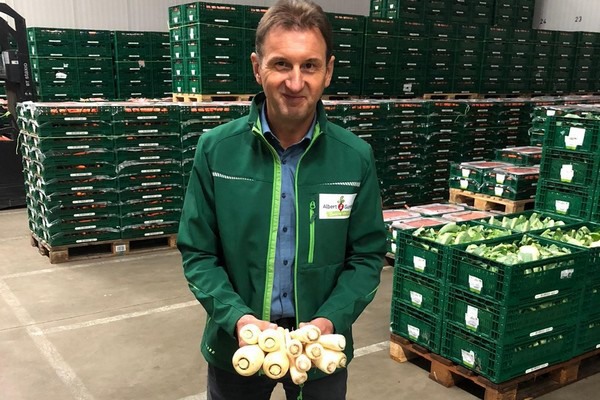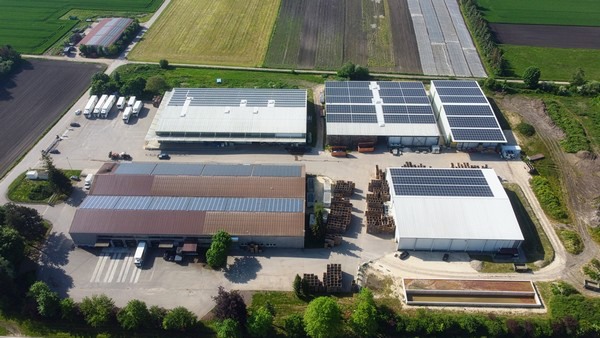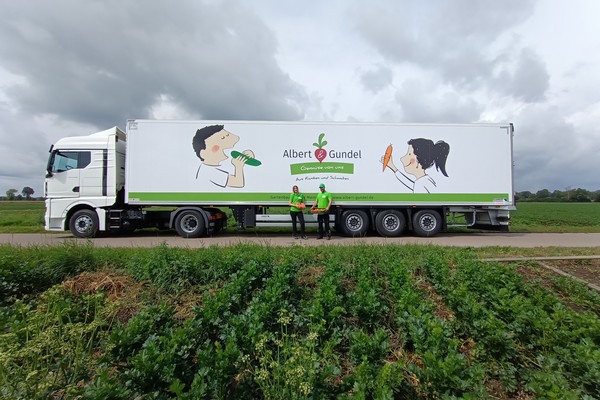Due to the heat and drought in midsummer, this year's harvest of many outdoor products initially got off to a rather late start. "The markets were actually undersupplied as a result. In the meantime, however, there is enough raw material and we can sufficiently serve all customers with root vegetables," reports Werner Hopf, managing director of the Gartenbauzentrale Main-Donau.
The hail only grazed the Gartenbauzentrale's open-air farms and affected about five percent of the carrot stocks. Hopf: "Apart from some visual dry damage, which was a result of the high summer temperatures, the stands are all passable. For parsley roots and parsnips, the season transition was smooth. For carrots, on the other hand, in contrast to previous years, we briefly took our leave of the market, as the purchased goods from outside Germany were unaffordable. Prices are currently higher than last year, but so are production and marketing costs. Demand is normal and always picks up for root vegetables when autumn temperatures drop."
 Werner Hopf shows regional root vegetables
Werner Hopf shows regional root vegetables
Regional root vegetables on the rise
The Gartenbauzentrale Main-Donau is a producer cooperative formed by a merger in 1998 and has two locations in Albertshofen and Gundelfingen. In Gundelfingen, vegetables are grown in the open and in Albertshofen mainly in greenhouses. The main focus is on supplying the Bavarian food retail trade, but another part of the fresh produce is also distributed via regional intermediaries or the Munich wholesale market. "Demand for regional products remains high, especially in southern Germany. We already have almost isolated Swiss conditions here, which is why non-Bavarian goods can hardly be placed. The limiting factor is access to arable land, because exchange areas with traditional farmers are often not equipped with irrigation facilities and can therefore only be used to a limited extent," explains Hopf.
Regional root vegetables in particular have risen considerably in favor with consumers thanks to cooking shows and magazines, Hopf describes using a specific example. "White beer radish is a Bavarian phenomenon, but we had almost written it off, thinking that this group of buyers was dying out. However, the product is experiencing a renaissance, currently also pushed by the Oktoberfest. The radish is grown on sandy, humusy loam soils, which are perfect for radishes. This has helped make us the market leader among German growers' organizations for this product."
 The Gartenbauzentrale Main-Donau has state-of-the-art facilities at two locations.
The Gartenbauzentrale Main-Donau has state-of-the-art facilities at two locations.
New sorting and packaging technology
In order to meet the continued high demand for regional root vegetables in the future, the Gartenbauzentrale has invested in a new carrot sorter. "We had to increase the clout, i.e. the output, in order to continue to serve our customers fully. In addition, the sorting specifications on the part of food retailers are tending to become more demanding. In terms of packaging, the market is tending towards less film or loose, i.e. laid gourmet goods. However, I still see organic films as problematic: they are usually not suitable for machines and consumers end up throwing them in the wrong garbage can."
Werner Hopf visiting the grower.
Difficult marketing year for greenhouse vegetables
In addition to a wide variety of outdoor vegetables, greenhouse cultivation is also practiced at the Albertshofen site. This market segment in particular has been confronted with significantly increased operating costs due to the energy crisis, Hopf confirms. The mood among cucumber farms, in particular, has been dampened, he says. "Many planted late due to the energy prices and thus were unable to benefit from the extremely high March prices. After that, prices fell into a bottomless pit, as all the late sets came onto the market in a clump. It is incomprehensible to us why, with the best German market supply, promotions are mainly run with Dutch produce."
According to Hopf, this year's challenges will probably accompany us in the years to come. "Currently the main concern among our member companies is labor: good people tend to be harder to get, not only because their demands on working and living conditions are permanently increasing, but also because different nationalities cannot be mixed. The rising minimum wages are a constant topic. Large farms try to counteract this with modern technology, family farms can hardly afford these investments financially and are forced to give up," Hopf continues.

The Gartenbauzentrale supplies both the Southern German food retail trade and customers at the Munich wholesale market.
On the subject of water law, we are currently in dialog with the responsible authorities and are trying to make it clear to them that vegetable cultivation does not work without water and that the industry - if it continues like this - will eventually migrate abroad. Unfortunately, we lack the lobby here, because Germany is not an agricultural country. I'm convinced that, especially among greenhouse farms, only those with cheap energy, such as waste heat from neighborhood biogas plants, will survive."
Images: Gartenbauzentrale Main-Donau eG
For more information:
Werner Hopf
Gartenbauzentrale Main-Donau eG
Bächinger Strasse 75 
89423 Gundelfingen/ Do.
T: 09073/ 9503-10
F: 9503-22
[email protected] www.albert-gundel.de
